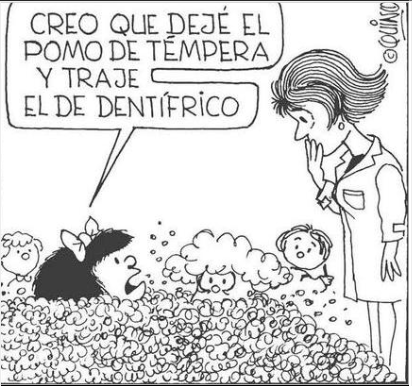A while ago, when browsing the collective works of Mafalda by the Argentinian cartoonist Quino, I tried having parts of the sentence translated from Spanish to English by Google Translate.

This is what I tried as inputs:
el pomo de témpera
el pomo de tempera
el pomo
de tempera
and this is what I got as the results eventually:
the tempering pommel
the seasoning pommel
he snitch
tempered
Why Google Translate even failed to properly identify articles and proper nouns, instead translating them into pronouns and verbs, is beyond me.
However, what Mafalda really refers to is a jar of paint, specifically the “tempera” kind of paint, which has pigments combined with delicate emulsifiers.
Also tried a translation to German, which for “pomo de témpera” gave me a word I had never heard of: “Würzknauf”. Which would translate to “seasoning knob” if used in an English context.
Shockingly, trying the Google web search on it, the results were very limited:

Why would Google return exclusively Arabic texts (which, judging by the results Google Translate gives me, seem to be very sexually explicit) for a made-up German word that their own system had in all likelihood created itself? Was this a foreshadowing of the hallucinating artificial intelligence systems like ChatGPT?
Maybe the following paper could shed some light on the inner workings of the neural networks that drive the Google search engine technology?
https://people.cs.rutgers.edu/~sm2283/papers/FSE18.pdf (dead link, now found at https://people.cs.umass.edu/~shiqingma/papers/FSE18.pdf)
Google Chrome website translation
Google Chrome website translation from Singhalese to German in Chrome 78 was not supported for some unknown reason, and when German was selected as the target language, translation failed, while a translation to English worked fine.
In the current Google Chrome version 120, a Russian Wikipedia article translated to German does not preserve the context of numbers, i.e. it switches bases and exponents of numbers written in scientific notation.
The example here is https://ru.wikipedia.org/wiki/%D0%92%D0%B8%D1%80%D0%BA%D0%B0%D1%82%D0%BE%D1%80, the Russian Wikipedia article on the vircator type of microwave generator.
Repeating the process of translating from Russian to German with Google Translate instead, the same problems dealing with scientific notation are exhibited, additionally failing to identify a HTML tag and including it in the translation instead.
All this leads me to believe that proper machine translation of digital documents still has a long way to go.
